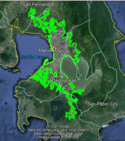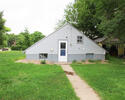Located on the Southern Plains, far from America’s coasts and great river systems, the Dallas–Fort Worth metropolitan area epitomizes the new trends in American urbanism. Over the past decade, DFW has grown by some 1.3 million people, to reach a population of just under 7.7 million, making it the nation’s fourth-largest metro, based on new figures from the 2020 census. Rather than building on natural advantages, the metroplex owes its tremendous growth to railroads, interstate highways, and airports, plus an unusual degree of economic freedom and affordability. read more »
Urban Issues
The One Element Missing from the Discussion of Housing in CA: Tolerance
In California we pride ourselves on being very tolerant of a diverse array of lifestyles and lifestyle choices. Dress how it suits you; love whom you love; define yourself in accordance with your own preferences. Do your own thing. Sing your own song. Dance your own dance. The Californian thing is to live and let live. read more »
- Login to post comments
Old Infrastructure, New Infrastructure
My latest column is now online at Governing and is about >how our infrastructure problem is in large part age related. It hits on themes I’ve talked about before, but since little ever changes in the American infrastructure debate, we always seem to end up repeating ourselves a bit. Here’s an excerpt: read more »
- Login to post comments
Jim Crow Returns to California
California’s leaders might see themselves as a vanguard of progressive and eco-friendly values. But in reality, their draconian climate policies have created a racially segregated state more akin to the pre-Civil Rights era South. read more »
The Failure of Dallas TOD
The Dallas Area Rapid Transit (DART), the transit agency serving Dallas and a dozen other cities, is proud of the fact that it has built the longest light-rail system in the country. It is almost as proud of the many transit-oriented developments (TODs) built near light-rail stations. read more »
Greater Manila 2020: The Evolving Urban Form
In 2021, the Manila built up urban area is estimated to have a population of 24.0 million, making it the fourth largest urban area in the world, according to Demographia World Urban Areas, covering 873 square kilometers and with a population density of 12,801 per square kilometer (33,135 per square mile). Only Tokyo, Jakarta and Delhi have larger populations. By comparison, the 2021 population of the New York urban area is 20.9 million. read more »
Will Emigres from the Coasts Change Us -- Or Are They Like Us?
Florida and Texas are experiencing dramatic results from the covid-induced diaspora of many thousands of Americans from the coasts to the American heartland. Gaggles of disenchanted New Yorkers are flocking to Florida these days, and legions of tech workers from Silicon Valley are disembarking for Austin. read more »
- Login to post comments
Grandpa's Basement House
My mother-in-law was born in a small town in rural Nebraska in 1941. Her father was oversees fighting World War II for the first few years of her life, so she and her mother lived on her grandparents’ farm in a society absent of young men. read more »
- Login to post comments
A COVID Postcard from Australia
Australia’s response to Covid-19 has quickly turned from laudable to laughable. For a nation which only a few months ago seemed to be the toast of world leaders for having so effectively limited the spread of the virus and still growing its economy, to a nation now lagging on vaccination and struggling with lockdowns, the turnaround has been dramatic. read more »
- Login to post comments
It's All About the Money: Who's Not Working?
— 3.9 million people quit their jobs in June.
— “We’re seeing the craziest counter-offers I’ve ever seen in my entire life,” says a recruiter. read more »
- Login to post comments






















